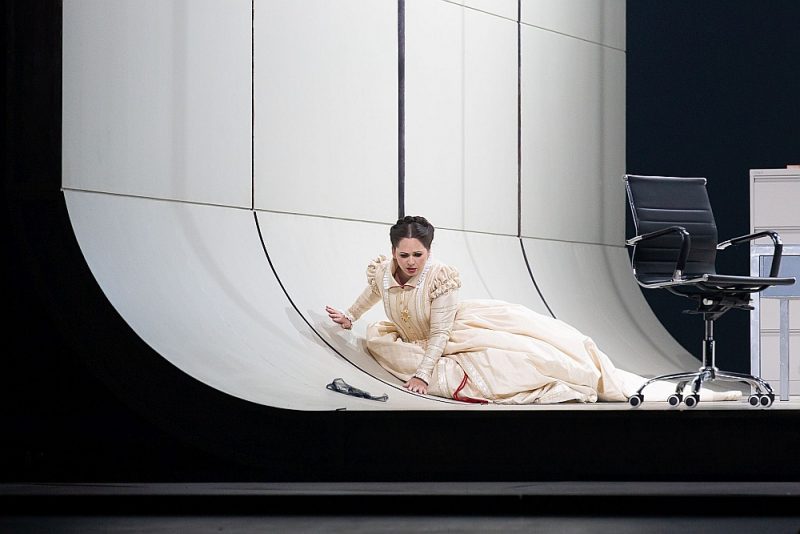
Tatjana Trenogina’s performance created the necessary contrasts within the performance ensemble.
Publicity (Agnese Zeltiņa) photo
7:08, September 30, 2021
–
Armands Znotins, “Culture Marks”, JSC “Latvijas Mediji”
Along with two ballets, after a long break at the Latvian National Opera, it is time for new productions again – on September 26, 2021, the premiere of Giuseppe Verdi’s opera “Simon Bokanegra” took place.
–
The news
1. review the amount of pensions in October. What do you need to know about pension indexation this year?
21 hours
–
Cocktail
PHOTO. “Here She Is, The Queen!”: Kate Middleton’s dress at the premiere of the film surprises everyone
18 hours
–
The news
Burnt out and will the unvaccinated teachers be replaced by young and energetic ones? Vanaga reveals that the problem in schools is not so simple
21 hours
–
The immediate question is – why this stage work, and not an opus of Mussorgsky, Borodin or John Adams, and you can immediately imagine the answer – because the opera “Simon Bokanegra” has never been performed in Latvia.
Considering the constant presence of Giuseppe Verdi’s works in the main repertoire of the Latvian National Opera, this seems suspicious, but there is also a counter-argument – in the end, the operas of the composer’s great predecessors Claudio Monteverdi, Alessandro Scarlati and Domenico Scarlati have never been staged.
However, there is also reason to suspect that “Simons Bokanegra” is not one of the best works in the Verdi 27 opera series, so again I had to focus on the soloists’ voices as a value in itself and the director’s performance as a phenomenon of the same autonomous nature. And here the problem of each other was revealed, although it must be admitted that there was no lack of professional qualities in the production.
So what is most important in opera? No, they are not soloists. The most important thing in the opera is the composer, and only then the soloists, despite the fact that this time I went to the premiere with the desire to find out how Rinald Kandalincev will realize the opportunity given to him to bring the title role to life in a classic feature film.
And the result turned out to be as good as I had hoped – the baritone’s voice was associated with vocal refinement and timbre filling, the singing sounded equally convincing throughout the two-part performance. Like other low voices, Rihards Mačanovskis’ performance in the role of Paolo Albiāni was especially addressed, but Lithuanian guest artist Tads Girininks in the role of Jakopo Fesco did not lag far behind, and Krišjānis Norvelis and Rihards Millers also felt exactly in the characters assigned to him.
Gabriele Adorno’s important role was given to tenor Mikhail Chulpayev, and it became another stable value of the show. Only one of the women’s roles is important here – Amelia Grimaldi, it was sung by another guest artist – Tatiana Trenogina, and her performance then also created the necessary contrasts within the performance ensemble.
Two conclusions from all the above – firstly, the Latvian National Opera has once again successfully used the potential of soloists available to it, and secondly, the opera house has continued its successful cooperation with foreign musicians.
The musical director of the production is a Latvian conductor – Normunds Vaicis, and his experience in working with the Latvian National Opera Orchestra and in dialogue with the choir resulted in an emotionally diverse reading of Verdi’s opus and a one-piece vocal-instrumental ensemble.
It should be noted that I will probably never get used to the sound of wind instruments and percussion instruments from the speakers, nor to the applause of lanterns in the middle of the musical flow, suppressing the above-mentioned orchestral play.
On the other hand, the creative team from Great Britain – director Steven Loless, set designer and costume designer Leslijs Traverss and choreographer Linne Hoknija, who have collaborated with light artist Oskars Pauliņš and video artist Uģis Ezerietis – have been chosen as the implementers of the stage design.
And this result, in turn, can be considered debatable, where the authors of the play sometimes managed to draw attention to a brighter conceptual idea, but other times only the visual aspects of the show were and remained at the center of observation.
The stage of the Latvian National Opera was used purposefully – the monumental construction of moving scenography reveals to the viewers both the polished, smoothed, impenetrable foreground plane and the vertical one behind it with its rough texture, and thus also two different levels of dramatic and symbolic activity.
In the middle is the tree and its metamorphoses – another symbol, and basically all this, apart from the deliberately illustrative contribution of the video artist.
On the other hand, in this case it is also difficult to blame that the director’s ideas have dissolved in the scenography, because the libretto of “Simona Bokanegra” does not cause any sympathy, and the composer does not lend a helping hand – only one scene lyrical at that very moment, the action seen on the stage also acquires intensity.
At other times, dolls move between decorations rather than living people, and these puppets are also dressed in costumes of different times. Although the director has his own explanation for this, in reality such a technique only emphasizes the general insignificance and confusion.
A strange similarity – Giuseppe Verdi’s “Simon Bokanegra” and Richard Wagner’s “Rienci” tell of two 14th-century Italian politicians, in fact contemporaries, about their triumph and death.
In both cases, the performances of the Latvian National Opera were composed by foreign directors, and both “Simons Bokanegra” in 2021 and “Rienci” directed by Kirsten Dalholm in 2014 left a certain confusion with the ambiguity of the message and the strange scattering of creative ideas.
Therefore, in the end, the question is: perhaps the production of Modesta Mussorgsky’s “Boris Godunov” or Philip Glass’s “Ehnaton” would be closer to the undoubtedly metaphysical secret of the machinery of political power? And what would happen if Latvian directors – Toms Treins, Valters Silis, Paula Pļavniece – were given an opportunity there?
Themes
–


